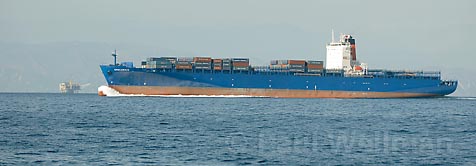Blue Whale Death Investigators Point Finger
Natural History Museum Necropsies Lay Blame on Ship Strikes, Laud Captains for Cooperation

The world’s largest mammals are puny compared to the cargo ships that ply the Santa Barbara Channel.
Natural History Museum curators gave a slide show of their necropsies on three Blue Whales of the five whose corpses starting turning up last September in the Santa Barbara Channel. Michelle Berman and Paul Collins also delivered their unambiguous pronouncement on the reason for the deaths: The leviathans were hit by cargo ships because they were hanging out in the shipping lanes, and they were hanging out in shipping lanes because that’s where the krill-the tiny shrimp that comprise most of their diet-happened to be in fall 2006. Blue whales, which weigh in as the world’s largest mammals at about 80 tons, are puny compared to the cargo ships that regularly ply the lanes. Ships have been known to pull into port at Long Beach or Los Angeles pushing a whale draped around their prow, Berman said, and not even notice they had hit anything.
Once listed as threatened, Blue Whales are still a protected species, with an estimated 3,000 individuals remaining, so the deaths were particularly worrisome.
The curators narrated a collection of necropsy photos that showed internal bleeding from the gigantic bruises caused by the ship-strikes, as well as sheared-off vertebraes and severed spinal cords, indicating that the whales died instantly. A foot-long shard of earwax, about an inch in diameter, recovered from one of the whales, was among the artifacts the curators brought for lecture attendees to examine, and what the whales heard or didn’t hear before they died was a main topic of discussion.
Berman speculated that a whale positioned directly in front of a ship might not hear it approaching because it would be in a silent cone, where sound waves generated by the ships engine–and the much louder underwater roar of displaced water–could not reach. Alternatively, Collins said, the whales may simply have been so intent on feeding that they did not pay attention to the ships’ approach. Collins added that the whales may not have recognized the ships as a danger. The ambient underwater noise may also have interfered with the whales’ responsiveness to particular sounds.
The curators concluded that Navy sonar testing, which has been blamed for causing ear damage in whales, had nothing to do with the deaths. The first whale corpse was found before the testing, near San Diego, began. Recent research shows only limited overlap between Navy sonar and the lower frequency range in which Blue Whales vocalize, Berman said, though they can probably hear more frequencies than they vocalize. Soft tissue in the ear of one of the necropsied corpses was too deteriorated to determine its condition when the whale died-Collins said it was literally cooking from the heat of decay by the time researchers got to it-but ear tissue from the second, fresher whale corpse showed no sound-induced damage.
The bright silver lining in the evening’s tales was the willingness of the ship captains and their companies to slow their ships as they came through the Channel. Berman said that within a week after researchers asked them to do so-which was as soon as they could adjust their schedules for coming into port-all of the ships voluntarily slowed to ten knots, which is about half of their accustomed speed. The curators said they believed whales could survive a ship strike at 14 knots, but not without injury. The ships maintained the slow pace for a month and a half, and perhaps as a result, there were no Blue Whale corpses found in October. The fifth was found shortly after the pace was picked up again in November, but researchers could not be sure when it died.
The Blues are expected to start migrating north in June. In case the krill, and the whales, congregate in the Channel again this year, a recently formed National Marine Sanctuary committee including scientists, shippers, fishers, and law enforcement stands ready to monitor and protect them.



